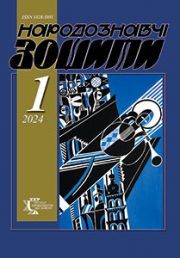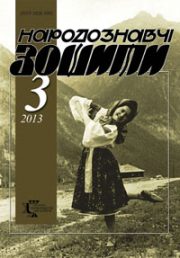The Ethnology Notebooks. 2020. № 2 (152), 385—394
UDK 069.7/.8:[069.62:004.738.5]:069.5](477)”1990/…”
DOI https://doi.org/10.15407/nz2020.02.385
KUSHNIR Vitalii
ORCID ID: https://orcid.org/0000-0001-8809-0108
Candidate of Historical Science
Research Fellow
Museum of Ethnography and Art Crafts
Of the Institute of Ethnology of the NationalAcademy of Science of Ukraine
15, Svobody ave., 79000. Lviv, Ukraine,
Contacts: e-mail: vitaliy_val@ukr.net
Abstract. In the post-war decades, Ukrainian museum studies were among those branches of the science which were strongly influenced by the ideological and political constraints inherent in the Soviet system. In the years of independence, museum researchers focused their efforts primarily on filling the numerous gaps in the museum history of Ukraine, returning to Ukrainian culture the once forbidden or almost forgotten names of museum figures.
Subsequently, Ukrainian museum studies began to turn to understanding the achievements of world theoretical museology. Today, one can already speak of national museology as a component of European, at least in terms of its problems. The purpose of our article is a brief analysis of the reflection of the main theoretical problems of museology in the works of contemporary Ukrainian researchers, the definition of the features of assimilation and interpretation of its basic approaches and categories, the separation of their own creative contribution to museum theory. The object of the research is the museological publications of modern Ukrainian scientists, and its subject — their key points, conceptual approaches and analytical conclusions. The chronological scope of the article covers the period from the early 1990s to the present.
It is proved that the theoretical space of Ukrainian museology today distinguishes a considerable variety of concepts and approaches learned in the post-Soviet period under the influence of European world museological theory. It is shown that Ukrainian museologists have offered variants of differentiation of types of museum communication, analysis of its main factors and mechanisms, actual innovations also. Particular attention was drawn to the problem of museum exposition as a core element of the special «language of the museum».
It was found that the subject of analysis of museum scholars was also the influence on the nature of museum communication of the latest information technologies, the Internet. A significant original contribution was made to the development of the concept of museum exhibit as a certain visual image, to interpret its creation as a kind of syncretic art genre.
A prominent feature of Ukrainian museology are the studies of multidisciplinary character. There have also been some attempts to analyze the museological problems along the lines of philosophical discourse.
Keywords: theoretical museology, Ukrainian museology, museality, object approach, museum communication theory, museum exposition.
Received 2.03.2020
REFERENCES
Banakh, V.M. (2016, september). Category of «muzeality» in modern muzeological discourse. Faces, 9 (137), 171—176 [in Ukrainian].
Klimishin, O.S. (2010). Modern Problems of Natural History of museology. Scientific notes of the State Museum of Natural History (Vol . 26, pp. 3—14). Lviv [in Ukrainian].
Rudenko, S. (2008). Methodology and Methods of Museum Studies. Culture and art in the modern world. Scientific notes KNUKiM (Vol . 9, pp. 90—97) [in Ukrainian].
Usenko, P.S. (2010). Museology: a science, a disciplinary image, or the totality of verbal forms? Bulletin of Dnipropetrovsk University. Series History and Archeology (Vol. 18, pp. 292—299) [in Russian].
Kurna, O. Museum communication in cultural and anthropological context. Retrieved from: http:// www.vuzlib.comua/articles/book/22550 [in Ukrainian].
Omelchenko, Y. (1999). The first subsystem of museumism (theoretical foundations, origins, formation). Cultural Studies. Collection of scientific works (Vol. 2, pp. 288—311). Kiev [in Ukrainian].
Omelchenko, Y. (1997). Museum as a subsystem of the museum activity. Ukraine: man, society, nature. Third Annual Scientific Conference on the 400th Birthday and 350th Anniversary of the Death of Peter Mohyla: Abstracts (P. 18—20). Kyiv [in Ukrainian].
Mankovska, R.V. (2009). Museum Studies as a Scientific Field: Contemporary Discourse and the Problem of Scientific Integration. Local History, 3—4 [in Ukrainian]
Kepin, D. (2004). Museum as a phenomenon of culture. Culture and art in the modern world. Scientific notes KNUKiM (Vol . 5, pp. 29—33) [in Ukrainian].
Mazuryk, S. (2016). The city and its museum. Reflections on the principles of the museological concept of creating a museum in Lviv. Rertrieved from: http:// dialogue.lviv.ua/misto-i-jogo-muzej. February 2016 [in Ukrainian].
Kozachenko, O.O (2014). Museum as a Sociocultural Phenomenon: Major Transformation Tendencies. International scientific forum: sociology, psychology, pedagogy, management (Vol. 16, pp. 117—128) [in Ukrainian].
Belofastova, T. (2009). To the question of the place of the museum in the system of cultural scientist knowledge. Culture and modernity, 2, 62—65 [in Ukrainian].
Kyridon, A. (2015). Museum as an Institute of Memory. Ukraine — Europe — World. Collection of scientific works (Pp. 193—200) [in Ukrainian].
Griffen, L. (2012). Museum as a Sociocultural Phenomenon. Nizhyn Antiquity (Issue 14 (17), pp. 5—11) [in Ukrainian].
Banakh, V.M (2017, august). The phenomenon of a museum object: the museum is an ethnological aspect. «Young Scientist», 8 (48), 26—30 [in Ukrainian].
Dashevska, I. (1999). Museum object as an important element of transformation of public relations of Ukraine. Millennium Museum: Past, Present, Perspectives. Collection of abstracts, reports and reports of the International Scientific Conference, dedicated to the 150th anniversary of the Dnipropetrovsk Historical Museum. D.I. Yavornytsky (Pp. 45—47). Dnipropetrovsk [in Ukrainian].
Bulanova, N. Semantics of the Museum Subject (Based on the Ethnographic Collection of the Museum of History of Dneprodzerzhinsk). Millennium Museum: Past, Present, Perspectives. Collection of abstracts, reports and reports of the International Scientific Conference, dedicated to the 150th anniversary of the Dnipropetrovsk Historical Museum. D.I. Yavornytsky (Pp. 49—50) [in Russian].
Rudenko, S. (2011). Museum monument: socio-cultural essence and place in the system of historical and cultural values. Abstract of … candidate of cultural studies. Kiev [in Ukrainian].
Yakovets, I. (2014). The communication space of the modern museum as one of the main categories of the theory of museum communication. KDADM Bulletin, 4—5, 129—133 [in Ukrainian].
Zapotochnyj, E.M. (2016). Museum as an element of public space of the city. The relevance of the development of the communicative function of the museum. Bulletin of the Odessa Museum of Local History (Vol. 15, pp. 4—6) [in Ukrainian].
Rudenko, S.B. (2009). Museum monument in the context of museums and material historical and cultural heritage. Ukrainian culture: past, present, ways of development (Issue 15, vol. 2, pp. 63—73) [in Ukrainian].
Belafastova, T. (2009). Museum in the system of modern communications. Bulletin of the State Academy of Management Personnel of Culture and Arts, 4, 36—39 [in Ukrainian].
Roik, Y. Simulation of the Museum Reality in Virtual Culture (Electronic resource). Retrieved from: http:culturologist.org.ua/i-conference/2013-/689-roik.html [in Ukrainian].
Verbytska, P. (2016). Museum Communication in the Challenges of Globalization. NU «LP». Historical and cultural studies, 1 (Vol. 3, pp. 21—24) [in Ukrainian].
Goncharova, O. (2015). Hermeneutic Aspect of Museum Communication. Culture of Ukraine (Vol. 48, pp. 139—150) [in Ukrainian].
Velyka, L. (2000). Museum exhibit art. Kharkiv: CDAC [in Ukrainian].
Soshnikova, O. (2012). The Sociocultural Context of Museum Communication. Abstract. Thesis for … Ph.D.09.00.04. Philosophical anthropology, philosophy of culture. Kharkiv [in Ukrainian].
Soshnikov, A.O. (2016). Modelling of the exposition image. Scientific Bulletin of Kharkiv National Pedagogical University. The Philosophy Series (Vol. 47, part II, pp. 3—8). Kharkiv: KhNPU [in Ukrainian].





